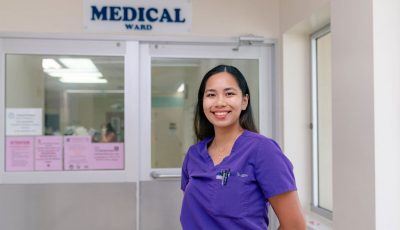CHCC could defer rate hike if…
The Commonwealth Healthcare Corp. yesterday could defer increasing its rates if the Legislature gives it the funds for the corporation to offset its growing charity care costs.
This was the response yesterday of CHCC chief executive officer Esther Muña when asked if she could defer increasing the rates if the Legislature provides the corporation about $16 million.
In a joint committee meeting of both the House of Representatives and Senate health and welfare committees yesterday, CHCC chief financial officer Derek Sasamoto said the total uncompensated care costs for fiscal year 2017 alone amounted to over $13 million.
Uncompensated care, also known as charity care, refers to amounts owed the hospital when medical services are rendered to those who cannot afford to pay their bills. CHCC is required under federal law to provide services to people in need regardless of their capacity to pay.
In yesterday’s meeting with the Legislature, Sasamoto said that, of the total uncompensated care, the amount of $12.7 million was posted by patients on Saipan, while $121,623 was posted on Rota and 162,482.51 was from Tinian.
The corporation expects a similar amount in fiscal year 2018.
In order to compensate for the overwhelming expenses and to make up for the lackluster revenue of the lone hospital in the CNMI, CHCC announced in the last week of September their plan to increase rates at the hospital—some by as much as 156 percent higher than previous rates.
Several members of the Legislature expressed disappointment with that decision and slammed the corporation during yesterday’s committee hearing while repeatedly asking how the corporation came up with the rates of increases.
According to Sasamoto, an estimated 92 percent of CHCC’s funding goes to “necessities” such as medical supplies, personnel salaries, utilities, etc., leaving CHCC with no room for cost-cutting measures.
Sen. Teresita Santos (R-Rota), who attended yesterday’s meeting with CHCC management and board members, described the increases as unreasonable.
“CHCC’s justification to execute an emergency regulation to increase room rates is untimely, unreasonable, and unacceptable, considering the care and services provided to our patients, and community alike. To many, the care and services rendered are substandard,” said Santos in a statement.
According to Santos, the room and board increases that CHCC seeks to implement would make the rates “astronomically high” and would eventually “become unaffordable where the indigent population will triple.”
“The goal that CHCC tries to achieve will be counterproductive,” she added.
Sen. Francisco Cruz (R-Tinian), one of many lawmakers that questioned the rate increases, questioned CHCC’s decision to implement room rate increases when hospital room services were not “to the highest standard.”
If CHCC needs help with funding, Cruz recommended that CHCC approach the Legislature, instead of increasing rates and “burdening the public”—which Sasamoto said the corporation did.
“We did come to the Legislature for help. We did. We came and asked for help at the very least for uncompensated care,” he said. “Nobody here in this room wants to turn anybody away who needs help.”
“Everyone here cares about healthcare, but we need to translate that into dollars,” he added.
CHCC was allocated a budget of just $708,311 for fiscal year 2018 and $844,933 for fiscal year 2017.
“I don’t even know what that is,” said Sasamoto, referring to the fiscal year 2018 allocation for CHCC.
Rep. Edwin K. Propst (Ind-Saipan) told both committees that he “has spoken with a lot of patients, CHC [Commonwealth Health Center] nurses, doctors, and management” who expressed concerns about the dire budgeting needs of CHCC.
“[I sincerely hope that] we prioritize the CHCC budget because it does not matter if you are rich or poor, to CHCC you will get the same treatment; everyone of us would get the same [medical] treatment,” he said.



























